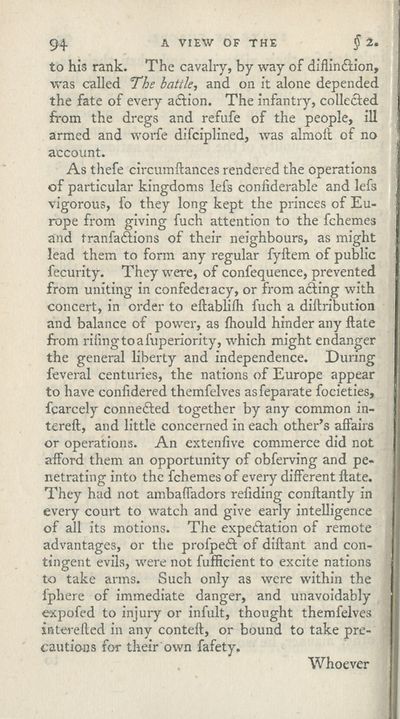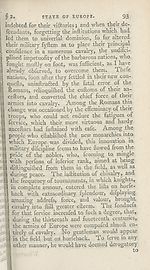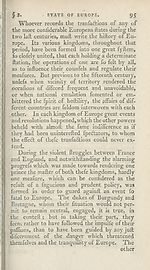Download files
Complete book:
Individual page:
Thumbnail gallery: Grid view | List view

A VIEW OF THE
94
§ 2.
to his rank. The cavalry, by way of diflinftion,
was called The battle, and on it alone depended
the fate of every adtion. The infantry, collected
from the dregs and refufe of the people, ill
armed and worfe difciplined, was almoft of no
account.
As thefe circumftances rendered the operations
of particular kingdoms lefs coniiderable and lefs
vigorous, fo they long kept the princes of Eu¬
rope from giving fuch attention to the fchemes
and tranfadtions of their neighbours, as might
lead them to form any regular fyftem of public
fecurity. They were, of confequence, prevented
from uniting in confederacy, or from adting with
concert, in order to eftablilh fuch a diltribution
and balance of power, as Ihould hinder any Hate
from riiingtoafuperiority, which might endanger
the general liberty and independence. During
feveral centuries, the nations of Europe appear
to have confidered themfelves asfeparate focieties,
fcarcely connected together by any common in-
tereft, and little concerned in each other’s affairs
or operations. An extenfive commerce did not
afford them an opportunity of obferving and pe¬
netrating into the fchemes of every different ftate.
They had not ambaffadors refiding conftantly in
every court to watch and give early intelligence
of all its motions. The expectation of remote
advantages, or the profpedt of diftant and con¬
tingent evils, were not fufficient to excite nations
to take arms. Such only as were within the
fphere of immediate danger, and unavoidably
expofed to injury or infult, thought themfelves
interefled in any conteft, or bound to take pre¬
cautions for their own fafety.
Whoever
94
§ 2.
to his rank. The cavalry, by way of diflinftion,
was called The battle, and on it alone depended
the fate of every adtion. The infantry, collected
from the dregs and refufe of the people, ill
armed and worfe difciplined, was almoft of no
account.
As thefe circumftances rendered the operations
of particular kingdoms lefs coniiderable and lefs
vigorous, fo they long kept the princes of Eu¬
rope from giving fuch attention to the fchemes
and tranfadtions of their neighbours, as might
lead them to form any regular fyftem of public
fecurity. They were, of confequence, prevented
from uniting in confederacy, or from adting with
concert, in order to eftablilh fuch a diltribution
and balance of power, as Ihould hinder any Hate
from riiingtoafuperiority, which might endanger
the general liberty and independence. During
feveral centuries, the nations of Europe appear
to have confidered themfelves asfeparate focieties,
fcarcely connected together by any common in-
tereft, and little concerned in each other’s affairs
or operations. An extenfive commerce did not
afford them an opportunity of obferving and pe¬
netrating into the fchemes of every different ftate.
They had not ambaffadors refiding conftantly in
every court to watch and give early intelligence
of all its motions. The expectation of remote
advantages, or the profpedt of diftant and con¬
tingent evils, were not fufficient to excite nations
to take arms. Such only as were within the
fphere of immediate danger, and unavoidably
expofed to injury or infult, thought themfelves
interefled in any conteft, or bound to take pre¬
cautions for their own fafety.
Whoever
Set display mode to:
![]() Universal Viewer |
Universal Viewer | ![]() Mirador |
Large image | Transcription
Mirador |
Large image | Transcription
| Antiquarian books of Scotland > Kings & rulers > History of the reign of the Emperor Charles V. > Volume 1 > (112) |
|---|
| Permanent URL | https://digital.nls.uk/109183675 |
|---|
| Description | By William Robertson. London : Cadell and Davies, 1798. |
|---|---|
| Shelfmark | ABS.1.76.13 |
| Additional NLS resources: | |
| Description | Thousands of printed books from the Antiquarian Books of Scotland collection which dates from 1641 to the 1980s. The collection consists of 14,800 books which were published in Scotland or have a Scottish connection, e.g. through the author, printer or owner. Subjects covered include sport, education, diseases, adventure, occupations, Jacobites, politics and religion. Among the 29 languages represented are English, Gaelic, Italian, French, Russian and Swedish. |
|---|

